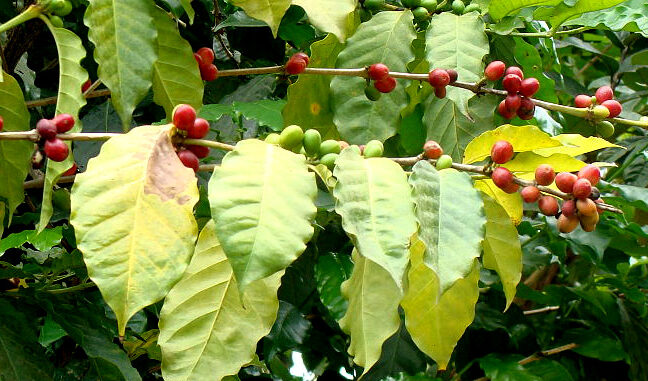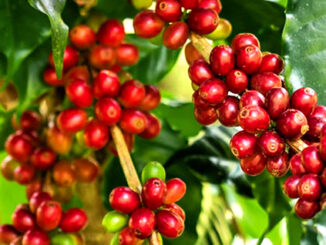
The Excelsa coffee (scientifically known as Coffea liberica var. dewevrei) is a rare and distinctive variety within the Liberica species.
Excelsa is renowned for its unique flavor profile, high adaptability, and genetic potential — traits that have inspired the development of several hybrid and regional coffee varieties.
Though often grouped under Liberica, Excelsa stands out for its distinct morphology, balanced flavor, and ability to enhance coffee hybrids.
🌿 Understanding Excelsa Coffee
Excelsa was first discovered in Central Africa, particularly in the region of Lake Chad, and later spread to West Africa and Southeast Asia.
It was scientifically identified as a variety of Liberica (Coffea liberica var. dewevrei) rather than a separate species, due to its close genetic similarity.
Key characteristics of Excelsa coffee plants:
- Tall trees reaching up to 15 meters
- Large, leathery leaves
- Oval cherries and asymmetrical beans
- Deep root systems for drought tolerance
- Natural resistance to certain pests and diseases
Excelsa thrives in humid tropical climates and performs well in low- to mid-altitude regions (200–800 m).
☕ Flavor Profile of Excelsa Coffee
Excelsa coffee is celebrated for its complex and layered taste that combines characteristics of both Arabica and Liberica.
Common tasting notes include:
- Tart, fruity acidity (often likened to tamarind or berry)
- Full body with smooth mouthfeel
- Hints of spice, dark fruit, and chocolate
- Distinct lingering aftertaste
Because of this complexity, Excelsa is often used in blends to enhance depth, brightness, and aroma.
🌱 Varieties and Hybrids Derived from Excelsa Coffee
Over time, breeders and researchers have used Excelsa’s strong genetic base to develop new hybrid varieties that improve resilience, yield, and flavor quality.
Here are some of the best-known derivatives and related hybrids:
1. Liberica var. Dewevrei Barako (Philippines)
- Developed from Excelsa-type Liberica trees in Batangas and Cavite.
- Known locally as Kapeng Barako.
- Produces large beans with strong, woody, and floral notes.
- Highly aromatic with a bold body and low acidity.
- Represents one of the few remaining heritage Liberica-Excelsa hybrids still cultivated commercially.
2. Liberica–Robusta Hybrids
- Crosses between Excelsa (Liberica var. dewevrei) and Robusta (Coffea canephora).
- Created to enhance yield, disease resistance, and climate adaptability.
- Grown in West Africa, the Philippines, and Indonesia.
- Flavor: heavy-bodied with earthy, nutty, and mildly fruity notes.
- Excellent drought tolerance and root strength.
3. Excelsa–Arabica Experimental Hybrids
- Experimental crosses developed in research stations across Africa and Asia.
- Aim to merge Excelsa’s hardiness with Arabica’s cup quality.
- Limited success due to genetic incompatibility, but ongoing studies explore grafting and gene editing techniques.
- Early results show potential for climate-resilient and aromatic varieties.
4. Dewevrei Local Strains (Africa)
- Wild and semi-domesticated forms of Coffea liberica var. dewevrei found in Congo, Uganda, and Cameroon.
- These strains exhibit natural diversity in flavor, size, and growth habit.
- Many are used as rootstock or breeding material for hybrid programs due to their strong root systems and drought resistance.
5. Southeast Asian Excelsa Varieties
- Found mainly in Vietnam, Indonesia, and Malaysia, where Excelsa is cultivated as a distinct coffee type.
- Known for their fruity aroma and wine-like acidity.
- Often blended with Robusta to add sweetness and aroma balance.
- In Vietnam, Excelsa (locally called Chari) makes up about 1–2% of total production but plays a key role in flavor diversity.
🌾 Agricultural Benefits of Excelsa-Derived Varieties
Excelsa’s genetics contribute several valuable traits to its hybrids and descendants:
✅ Drought resistance due to deep roots
✅ Adaptability to low altitudes and hot climates
✅ Natural disease tolerance, especially against leaf rust
✅ High potential for genetic diversity in breeding programs
✅ Strong flavor contribution in coffee blends
These attributes make Excelsa a vital resource for breeding climate-resilient coffee varieties.
⚙️ Challenges and Limitations
❌ Tall tree height makes harvesting difficult
❌ Low yields compared to Arabica and Robusta
❌ Limited global market demand due to unfamiliar flavor profile
❌ Inconsistent cup quality if not processed properly
Despite these limitations, Excelsa and its derivatives continue to attract attention from specialty coffee growers and researchers focused on future-proofing coffee agriculture.
🌍 Importance in the Future of Coffee
Excelsa’s genetic traits — especially its resilience and complex flavor potential — make it an essential component in global efforts to diversify coffee crops.
As climate change threatens sensitive species like Arabica, Excelsa hybrids and derived varieties could provide sustainable alternatives.
Ongoing research aims to:
- Use Excelsa as rootstock for other Coffea species
- Create new hybrids with improved taste and disease resistance
- Preserve wild Excelsa populations for future breeding projects
❤️ Final Thoughts
The Excelsa coffee variety (Coffea liberica var. dewevrei) is a hidden gem in the coffee world — a bridge between the boldness of Liberica and the complexity of Arabica.
Its derived varieties and hybrids demonstrate its genetic strength, adaptability, and flavor potential.
Though still niche, Excelsa-based coffees are gaining renewed interest for their sustainability, distinct cup profiles, and role in shaping the future of coffee cultivation.
☕ Excelsa — the underappreciated powerhouse of the coffee world.
DeliciousPath: Enjoyment in Every Moment
Explore the Gourmet on Board category for exquisite flavors that elevate your meals, even when you’re on a boat, and the Coffee category for aromatic coffee blends that make every moment special. DeliciousPath is here to turn every experience into something unforgettable!
























